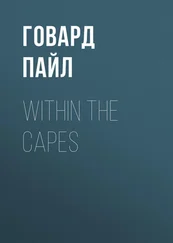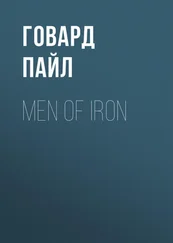Говард Пайл - The Story of Jack Ballister's Fortunes
Здесь есть возможность читать онлайн «Говард Пайл - The Story of Jack Ballister's Fortunes» — ознакомительный отрывок электронной книги совершенно бесплатно, а после прочтения отрывка купить полную версию. В некоторых случаях можно слушать аудио, скачать через торрент в формате fb2 и присутствует краткое содержание. Издательство: Иностранный паблик, Жанр: foreign_antique, foreign_prose, на английском языке. Описание произведения, (предисловие) а так же отзывы посетителей доступны на портале библиотеки ЛибКат.
- Название:The Story of Jack Ballister's Fortunes
- Автор:
- Издательство:Иностранный паблик
- Жанр:
- Год:неизвестен
- ISBN:нет данных
- Рейтинг книги:5 / 5. Голосов: 1
-
Избранное:Добавить в избранное
- Отзывы:
-
Ваша оценка:
- 100
- 1
- 2
- 3
- 4
- 5
The Story of Jack Ballister's Fortunes: краткое содержание, описание и аннотация
Предлагаем к чтению аннотацию, описание, краткое содержание или предисловие (зависит от того, что написал сам автор книги «The Story of Jack Ballister's Fortunes»). Если вы не нашли необходимую информацию о книге — напишите в комментариях, мы постараемся отыскать её.
The Story of Jack Ballister's Fortunes — читать онлайн ознакомительный отрывок
Ниже представлен текст книги, разбитый по страницам. Система сохранения места последней прочитанной страницы, позволяет с удобством читать онлайн бесплатно книгу «The Story of Jack Ballister's Fortunes», без необходимости каждый раз заново искать на чём Вы остановились. Поставьте закладку, и сможете в любой момент перейти на страницу, на которой закончили чтение.
Интервал:
Закладка:
A flight of high, ladder-like steps reached from the sandy beach to the summit of the bluff. Jack followed Mr. Parker up this stairway, leaving the man who had brought them to furl and tie the sail. Excepting the barking of dogs and the light in the window, there was at first no sign of life about the place as they approached. Then suddenly there was a pause in the dogs’ barking; then a renewed clamorous burst from half a dozen throats at once. Suddenly the light in the room began to flicker and move, and Jack could see a number of dim forms come around the end of the house. The next minute a wide door was opened, and the figure of a woman appeared, holding a candle above her head. Instantly half a dozen hounds burst out of the house from behind her and came rushing down toward Jack and Mr. Parker, barking and baying.
Mr. Parker paid no attention to the dogs, but led the way directly up the flight of tall, steep steps and into the hallway. He nodded to the woman as he passed, speaking briefly to her, and calling her Peggy.
She was rather a handsome woman, with a broad face and black hair and eyes. She stood aside and the master passed her into the house, Jack following close at his heels. “Here are two letters for you,” said the woman, and she gave them to him from the table; and Mr. Parker, without laying aside his hat, took them, tore one of them open and began reading it by the light of the candle which she held for him. As he read, his eyebrows drew together into a knot of a frown, and his handsome florid face lowered.
Meantime Jack stood gazing about him at the large, barren hallway barely lit by the light of the candle. At the further end he could just distinguish the dim form of a broad bare, stairway leading up to the floor above. It seemed to be very cheerless, and he felt strange and lonely in the dark, gloomy space. Several negroes were standing just outside of the door, looking in; he could see their forms dimly in the darkness. They appeared weird and unreal, with their black faces and shining teeth.
Suddenly Mr. Parker looked up from the letter he was reading and bade the woman, Peggy, to take Jack out to the kitchen and to give him something to eat.
When Jack entered the kitchen he found the man who had brought him and Mr. Parker down the river in the boat, sitting at the table eating, while a barefoot negro woman, with necklace and bracelets of blue glass beads, waited upon him. The man looked up and welcomed Jack as he came in, and then almost immediately began asking him questions about England. The feeling of loneliness and depression was settling more and more heavily upon Jack’s spirits, and he replied vaguely hardly knowing what were the questions asked him, or what he said in answer. After he had ended his supper, he went and stood in the doorway, looking out into the starlit night. He thought he saw the dim forms of human figures moving about in the gloom, and the black outlines of rude buildings. The warm darkness was full of the ceaseless whispering noises of night, broken now and then by the sudden sound of loud gabbling negro voices. The mockingbirds were singing with intermittent melody from the dark stillness of the distant woods. His feeling of depression seemed to weigh upon Jack’s soul like a leaden weight. He could almost have cried in his loneliness and homesickness.
When Jack woke at the dawning of the next day, in the little bare room at the end of the upper hall where he slept within easy call of Mr. Parker’s voice, he did not at first know where he was. Then instantly came recollection, and with it a keen longing to see his new surroundings. He arose, dressed hastily, and went down-stairs and out of doors. Everything looked very different in the wide clear light of early morning. The buildings he had seen in the blackness of the night before resolved into a clustered jumble of negro huts, – some of frame, some of wattled sticks, – about which moved the wild figures of the half-savage black men, women, and children.
Jack walked out into the open yard, and turned and looked back at the house.
It was a great rambling frame structure, weather-beaten and gray. Several of the windows were open, and out of one of them hung a patchwork bed-coverlet, moving lazily now and then in the wind. A thin wreath of smoke curled away from one of the chimneys into the blue air. Everything looked very fresh and keen in the bright light of the morning.
A lot of negro children had been playing about the huts, some of them entirely naked. They ceased their play and stood staring at Jack as he came out into the open yard, and a negro lad of about his own age, who was standing in the door of a wattled hut at a little distance, came over and spoke to him. The black boy was lean and lanky, with over-grown, spider-like legs and arms. He had a little round, nut-like head covered with a close felt of wool. “Hi, boy!” he said, when he had come up close to Jack, “what your name?”
“My name’s Jack Ballister,” said Jack; “what’s your name?”
“My name Little Coffee,” and the negro boy grinned with a flash of his white teeth.
“Little Coffee! Why, to be sure, that’s a very queer name for any Christian soul to have,” said Jack.
The negro boy’s grin disappeared into quick darkness. “My name no queer,” he said, with a sudden childish sullenness. “My name Little Coffee all right. My fader Big Coffee – I Little Coffee.”
“Well,” said Jack, “I never heard of anybody named Coffee in all my life before.”
“Where you come from?” asked the negro boy.
“I came from England,” said Jack; “we drink coffee there; we don’t give Coffee as a name to Christian souls. Where do you come from, Coffee?”
“Me come nowhere,” said Coffee, with a returning grin. “Me born here in yan house.”
Beyond the row of negro huts was a small wooden cabin of a better appearance than the others. Suddenly a white man came out of the door of this hut, stood looking for a moment, and then walked forward toward Jack. It was Dennis, the overseer. He – unless Peggy Pitcher be excepted – became almost the most intimate friend Jack had for the two months or so that he lived at the Roost; and in this curiously strange fragment of his life, perhaps the most vivid recollections that remained with him in his after memory were of intervals of time spent in Dennis’s hut; of the great black, sooty fireplace; of the shelf-like floor at the further end of the cabin, where was the dim form of the bed with the bright coverlet; of Dennis’s negro wife, pattering about the earthen floor in her bare feet, her scant red petticoat glowing like a flame of fire in the shadowy interior; of Dennis himself, crouching over the smoldering ashes, smoking his Indian clay pipe of tobacco. As Dennis now approached, Jack thought that he had hardly ever seen a stranger-looking figure, for a pair of gold ear-rings twinkled in his ears, a broad hat of woven grass shaded his face, he wore a pair of loose white cotton drawers, and a red beard covered his cheeks and chin and throat. “I do suppose,” said Dennis, when he had come close enough to Jack – “I do suppose that you are the new boy that came last night.”
“Yes,” said Jack, “I am.”
CHAPTER XIV
IN ENGLAND
IT is not to be supposed that Jack could have disappeared so suddenly and entirely as he had done without leaving behind him much talk and wonder as to what had become of him.
One day, for instance, Mr. Stetson stopped old Hezekiah in the street and began asking after Jack. “I know nought of him, Master Stetson,” said the old man. “He always was a main discontented, uneasy lad as ever I see. Time and time again have he talked to me about running away to sea – and that, whenever I would tell him ’twas time for him to be earning his own living by honest, decent work.”
Читать дальшеИнтервал:
Закладка:
Похожие книги на «The Story of Jack Ballister's Fortunes»
Представляем Вашему вниманию похожие книги на «The Story of Jack Ballister's Fortunes» списком для выбора. Мы отобрали схожую по названию и смыслу литературу в надежде предоставить читателям больше вариантов отыскать новые, интересные, ещё непрочитанные произведения.
Обсуждение, отзывы о книге «The Story of Jack Ballister's Fortunes» и просто собственные мнения читателей. Оставьте ваши комментарии, напишите, что Вы думаете о произведении, его смысле или главных героях. Укажите что конкретно понравилось, а что нет, и почему Вы так считаете.






